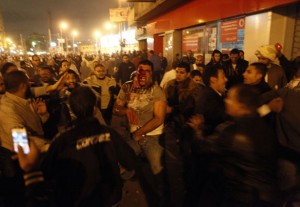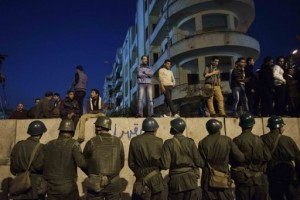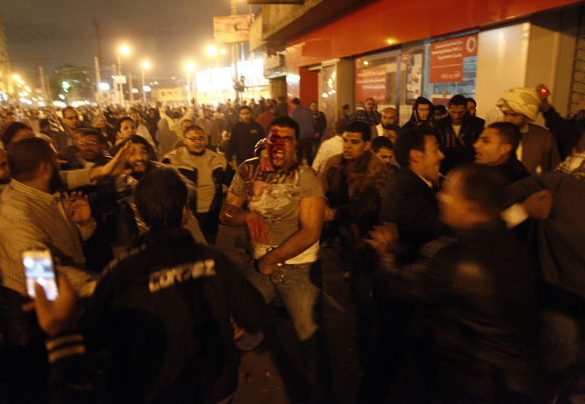
(AFP Photo / Mahmoud Khaled)
Calls have been made for an investigation into the killings, illegal detention, and incitement to violence that occurred outside the Presidential Palace on 5 December. A Human Rights Watch (HRW) report focused particularly on the role of authority figures and asked the new prosecutor general to conduct even-handed and comprehensive investigations.
The report, issued Friday, focussed on the illegal detention just outside the palace of 49 anti-Morsy protesters by Morsy supporters.
“They have no right whatsoever to basically tie people up,” said Mohamed Lotfy who works with Amnesty International in Egypt. “In the Egyptian penal code there is an article that criminalises detention of civilians by other civilians.”
HRW’s condemnation focuses especially on two parties who supported the detention: Freedom and Justice Party leaders and the security forces who were on the scene.
“Instead of condemning illegal detentions and abuse right outside the presidential palace, President [Mohamed] Morsy spoke out against the victims,” said Joe Stork, the head of HRW in the Middle East, referring to Morsy’s 6 December speech in which he stated he had evidence that those arrested (he did not say if he was referring to civilian or police arrests) were hired and provided with weapons. He went on to say that the incitement could have perhaps come from abroad.
The HRW report also makes accusations of incitement, but directs them largely against the Freedom and Justice Party leadership which is cited numerous times as inciting Wednesday’s violence.
FJP leader Essam El-Erian tweeted before the clashes saying, “the people should go to all the squares in all the governorates; especially in front of the Ittihadiya [Presidential Palace]… If state agencies are weak and still damaged by the wounds of the past, the people can impose their will and protect legitimacy. Members of the FJP will be on the frontline, God-willing.” Later on the same day El-Erian gave an interview saying, “everyone must go now to Ittihadiya and surround the thugs and separate the real revolutionaries out for one or two nights and then we can arrest them all.”
Now that proceedings are underway in a highly politicised investigation, all eyes will be on new Prosecutor General Tala’at Abdallah who was installed by President Morsy’s controversial 21 November constitutional declaration.
“He will not investigate it fairly, he is a man of Morsy’s regime,” said Ahmed Yousry, programme and workshops coordinator at the Hisham Mubarak Law Centre. Yousry said he believed this because Abdallah has relatives involved with the Muslim Brotherhood and the only reason for his lack of membership is the fact he is a judge. Despite not being a member, said Yousry, “he is 100 per cent in support of the Muslim Brotherhood.”
This assertion was countered by Mostafa Al-Khatib, a journalist for the Freedom and Justice Party. “[Abdallah] was chosen by Dr Morsy but this does not mean he is so close,” he said. “It is not evidence that he is a Muslim Brother or even that he is near to them or their thinking.”
Another entity whose actions are coming under question is that of the security forces who largely stood by as the two civilian mobs engaged in street battles.
“There is an element of complicity from the police,” said Amnesty’s Lotfy. “The riot police were basically surrounding them, acting in a way as guards or agents of the civilians [who were doing the detaining] at the door of the Presidential Palace.”
Said Al-Khatib, “the Muslim Brotherhood went to the palace because they had assured information that the opposition… intended to break into the palace. The police did not intercede, which is a greater problem. [All] the police did was to shoot teargas and they didn’t do that until after the killing started.”
When asked why the security forces stayed so long on the sidelines, Al-Khatib said, “they don’t want to get involved in such clashes because the opponents and the media will say they supported the Ikhwan [Muslim Brotherhood].”
On this point Yousry agreed, “the police and the army are still the army of the old regime, and they kind of hate the Muslim Brotherhood, so they decided to stay neutral and not get involved between protestors and the Muslim Brothers. Maybe they are happy with what happened.”
The foundation for the clashes were laid on the afternoon of 5 December, when supporters of President Morsy arrived at the Palace and tore down tents erected by anti-Muslim Brotherhood protesters the night before.

“We are here to support the legitimacy of Dr Morsy,” said one of the protesters, “there is nothing better than this constitution.” Others chanted “yes to the constitution.”
After the opposition had a chance to regroup, they returned to the palace and a melee ensued for hours. When the dust settled a handful of civilians had been killed and five presidential advisers resigned in protest.
The opposition sit-in is still on-going with dozens of tents and a makeshift exhibition set up along the lawn across the street from the Presidential Palace. Concrete barriers were constructed this week to keep protesters off the grounds, but tens of thousands had no trouble making their way to the palace walls for peaceful protests on Tuesday as dozens more stood atop the walls dismantling them.




